|
|
|
Sort Order |
|
|
|
Items / Page
|
|
|
|
|
|
|
| Srl | Item |
| 1 |
ID:
133255
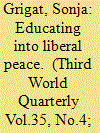

|
|
|
|
|
| Publication |
2014.
|
| Summary/Abstract |
Indonesia has seen excessive political violence in the first years since the end of autocratic rule under former president Suharto. Documented violence has ranged from separatist struggle to communal strife to terrorist attacks. The International Crisis Group (icg) has reported extensively on the conflicts underlying this violence and has formulated policy advice on how to overcome them. While the icg's reports on Indonesia have been acknowledged for their detailed and accurate account of micro-level violence, their recommendations reveal their political objectives. The icg's panacea for overcoming violent conflicts is institution building and security sector reform, which are centrepieces of the 'standard programme' of liberal peace- and state building. However, it is not only its policy advice but all the icg's publications in general that aim to diffuse the liberal governance agenda. This article argues that, through the narrative technique of epideictic oratory, the icg is aiming to educate its audience into a liberal governmentality characterised by practices and procedures which effect a de-politicisation of violence, foster liberal forms of governance and self-government and thus contribute to sustaining liberalism as a global 'regime of power'.
|
|
|
|
|
|
|
|
|
|
|
|
|
|
|
|
| 2 |
ID:
133264
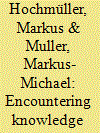

|
|
|
|
|
| Publication |
2014.
|
| Summary/Abstract |
After nearly seven years of ever-escalating violence related to the Mexican 'war on drugs', in 2013 Mexico entered the International Crisis Group's (icg) 'observatory' of countries facing a violent crisis. In this article we critically interrogate this 'Mexican turn' of the icg, as well as its accompanying forms of crisis knowledge production. By applying analytical insights from critical policy analysis and postcolonial security studies, we highlight the Western-centrism embedded in the icg's perspective on Mexico's security crisis. In analysing this perspective on questions of drug trafficking, statehood and indigenous justice, we demonstrate how this Western-centrism produces a de-politicising and overly technocratic crisis narrative. The article concludes that, through its Western-centric 'Mexican turn', the icg has been able to reaffirm its standing as a uniquely influential and internationally recognised crisis expert by showcasing its awareness of newly emerging crisis situations, as well as its possession of the necessary crisis-solving expertise.
|
|
|
|
|
|
|
|
|
|
|
|
|
|
|
|
| 3 |
ID:
133263
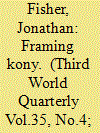

|
|
|
|
|
| Publication |
2014.
|
| Summary/Abstract |
This article explores the influence of actors and organisations outside the corridors of power in Washington, DC on US 'crisis foreign policy making' in Africa. Focusing on the case of US policy towards the lra/northern Uganda crisis - particularly the Obama administration's 2011 decision to send 'combat-equipped US forces' to pursue the rebel group across central Africa - it is argued that the role of African governments themselves merits greater consideration. The decision to send in these 'military advisers' was arguably strongly influenced by campaigns run by Western policy institutes, notably the International Crisis Group, and US advocacy groups since around 2007. The Ugandan regime of Yoweri Museveni has - it is suggested - nevertheless itself fundamentally shaped the nature and direction of the debate into which such groups have entered. This raises crucial questions about the agency of African governments in Western 'crisis' decision-making fora.
|
|
|
|
|
|
|
|
|
|
|
|
|
|
|
|
| 4 |
ID:
133260
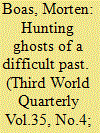

|
|
|
|
|
| Publication |
2014.
|
| Summary/Abstract |
This article explores the relationship between the International Crisis Group's (icg) interpretation of the civil wars in Liberia and Sierra Leone and the main academic 'greed and grievance' debate at the time. It shows that the icg's early policy recommendations were basically in line with the interpretation of these wars as caused by 'opportunistic warlordism'. However, this supposed causal link is less evident in the analytical parts of its early reports, and in the policy recommendations of later reports. These contradictory findings point to both internal developments within the icg and to its 'two faces': it seeks to influence policy makers using detailed empirical analysis on the ground in countries in conflict or transition, but is also aware that policy makers do not generally read long reports, thus it produces executive summary and policy recommendations for this target audience. The article argues that policy recommendations cannot work without the analytical parts of the reports: the analysis sections' main function is to add legitimacy to policy recommendations and the organisation overall, contributing to its image as a genuine 'on-the-ground producer' of crisis knowledge and fostering its expert authority.
|
|
|
|
|
|
|
|
|
|
|
|
|
|
|
|
| 5 |
ID:
133256
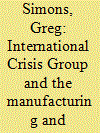

|
|
|
|
|
| Publication |
2014.
|
| Summary/Abstract |
The International Crisis Group (icg) has the motto 'working to prevent conflict worldwide'. As an organisation the icg occupies a very specific niche role, which is related to crises of a political nature, specifically armed conflict. While the icg employs a negative understanding of crisis, the academic definition of what a crisis may constitute is broader, as it can actually represent an opportunity for some actors. This article, written from a communication studies perspective, seeks to address how crises are manufactured in icg texts. It argues that the way in which crisis events are viewed and reacted to depends on the level of information and 'knowledge' that is produced and circulating about them. The article tackles the issue of the strategic level of the icg in terms of its means and mechanisms of attempting to project influence. It explores the different ploys and strategies used to influence policy makers, especially its communication strategy, the different values and ethics that are highlighted, and the 'causes' that are promoted.
|
|
|
|
|
|
|
|
|
|
|
|
|
|
|
|
| 6 |
ID:
133262
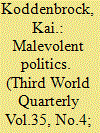

|
|
|
|
|
| Publication |
2014.
|
| Summary/Abstract |
Since the start of reporting during the 'Congo wars' in 1998 the International Crisis Group (icg) has been one of the most important sources of information for Western analysts, UN agencies and ngos dealing with the political and economic challenges of the Democratic Republic of Congo. This article takes a closer look at the way Congolese government politics is analysed in icg reports. It shows that the logics of government and the dilemmas of rule in a country with the size, geography and history of the DRC receive hardly any attention in icg reporting. Building on Klaus Schlichte's approach to the dilemmas of rule, the article argues that President Joseph Kabila has in fact responded skilfully to the dilemmas of elite inclusion across the different hubs of power and wealth from the Kivus to Katanga to the capital Kinshasa. While his political and human rights records are by no means impeccable, not all is rotten in the state of Congo, and the Kabila government deserves more analytical rigor and openness than is offered by the pathologising modes of analysis used by the icg.
|
|
|
|
|
|
|
|
|
|
|
|
|
|
|
|
| 7 |
ID:
133258
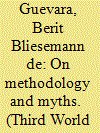

|
|
|
|
|
| Publication |
2014.
|
| Summary/Abstract |
Exploring the historiography of the International Crisis Group (icg), this article looks critically at the narratives surrounding the organisation's self-declared success. The focus is specifically on the so-called icg methodology, consisting of field-based research and analysis, practical policy recommendations and high-level advocacy. Combining a three-level approach to the analysis of organisational cultures with Yanow's concept of organisational myths, the article argues that the icg methodology contains a number of organisational myths that are meant to mask tensions and contradictions in the organisation's underpinning basic assumptions and values, which, if publicly discussed, could have the power to undermine its expert authority. The four myths looked at in detail are the 'field facts myth', the 'myth of flexible pragmatism', the 'myth of uniqueness' and the 'neutrality/independence myth'.
|
|
|
|
|
|
|
|
|
|
|
|
|
|
|
|
| 8 |
ID:
133257
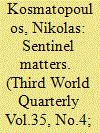

|
|
|
|
|
| Publication |
2014.
|
| Summary/Abstract |
In this article I focus on the crisis experts in Lebanon and, in particular, on one celebrated expert response to crisis, the crisis report. I suggest looking at the report as a techno-political tool that seeks to produce and disseminate knowledge about crisis and conflicts in different parts of the world, while packaged and structured in a universal format. As a first step I analyse the particular features of this format, such as size and scale. The main argument is that the report presents itself as an assemblage of a series of technical characteristics that help to shrink the world and make it fit the model format of the crisis expert. In a second step I open up the perspective and link the report's micro-format to bigger questions on governing the world today. Here, I argue that, within current imaginaries of emergency, impending crisis and global terrorism, the crisis report functions as a particular kind of sentinel. I show that it can speak through the language of constant alertness and, crucially, the production of sentinel subjectivities that must be continuously monitored.
|
|
|
|
|
|
|
|
|
|
|
|
|
|
|
|
| 9 |
ID:
133254
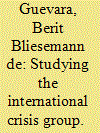

|
|
|
|
|
| Publication |
2014.
|
| Summary/Abstract |
This special issue studies the International Crisis Group (icg), one of the most notable and widely referenced producers of knowledge about conflict areas, used extensively by policy makers, the media and academics. The authors take different theoretical and methodological approaches to make sense of this hard-to-ignore conflict expert, exploring the icg's daily operations and role in international politics. This introduction sets the scene by offering a critical exploration of the organisation and its approach to the construction of political knowledge. It analyses the icg's position in the conflict-related knowledge market and the sources of its expert authority. It then discusses the organisation's roles - from mediation to instrumentalisation - in the 'battlefield of ideas' in conflict and intervention contexts and its potential to make an impact on policy framings and outcomes. It shows that studies of the icg need to 'unpack' the organisation in order to account for it as both a highly successful international expert brand and a very heterogeneous actor in specific contexts and at specific times.
|
|
|
|
|
|
|
|
|
|
|
|
|
|
|
|
| 10 |
ID:
133259
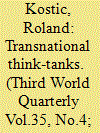

|
|
|
|
|
| Publication |
2014.
|
| Summary/Abstract |
Peace-building situations can be described as battlefields of ideas where key international policy makers engage in internal battles for control over intervention policy. Knowledge production, based on timely information and analysis, is seen as crucial to winning these battles of ideas. By providing detailed information, analysis and recommendations, the International Crisis Group (icg) has assumed an important role in this process. Yet we know little about the specific role the icg plays in battles for intervention policy. This article investigates icg analyses and recommendations and the way they fit into the specific internal debates within the international community in Bosnia and Herzegovina (BiH) in 2000-01. By looking at the work of the icg in BiH around the elections in 2000, the article demonstrates that it often acted as a legitimising agent of US positions and policy in the country.
|
|
|
|
|
|
|
|
|
|
|
|
|
|
|
|
|
|
|
|
|